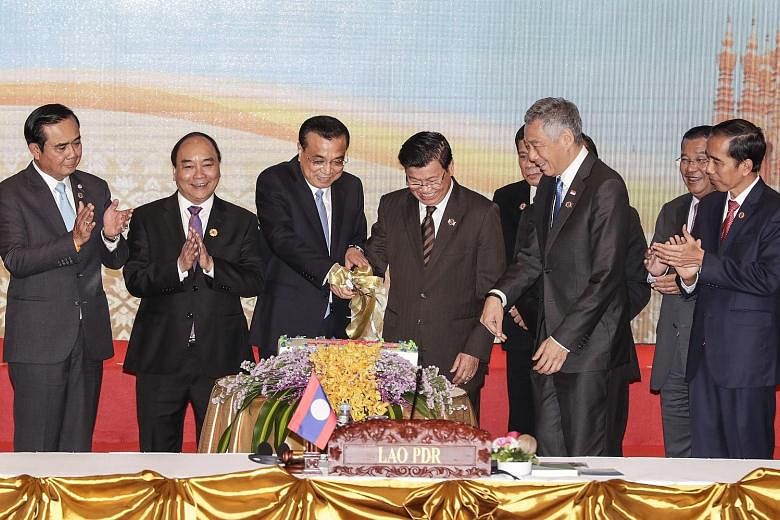In a bid to contain flare-ups in the South China Sea, Asean and China have pledged to apply a Code for Unplanned Encounters at Sea (Cues) and make hotline arrangements for maritime emergencies.
Leaders from the Asian power and the 10-nation bloc also adopted a joint statement after the Asean- China summit here yesterday that pledged closer cooperation and to also exercise self-restraint over the strategic but contested waterway.
While affirming commitment to freedom of navigation and overflight in the South China Sea, all parties also pledged to "resolve the territorial and jurisdictional disputes by peaceful means, without resorting to the threat or use of force, through friendly consultations and negotiations by sovereign states directly concerned, in accordance with the universally recognised principles of international law, including the 1982 Unclos (United Nations Convention on the Law of the Sea)".
The statement did not mention a ruling by an Arbitral Tribunal at The Hague in July that dismissed China's historical claims to nearly all of the South China Sea.
Ties between Asean and China have been dogged by the South China Sea territorial dispute in recent years. China claims almost all of the resource-rich waterway, while Vietnam, the Philippines, Malaysia and Brunei lay claim to parts of it. China has created outposts from islands it has reclaimed from the contested waters, sparking fears of a military build-up in the region.
In their joint statement, Asean and China expressed their commitment to full and effective implementation of an earlier agreed upon declaration of conduct, and to "work substantively" towards the "early adoption" of a more binding Code of Conduct on the South China Sea "based on consensus".
Prime Minister Lee Hsien Loong, speaking during yesterday's summit, stressed that Asean's overall relations with China were broader than the South China Sea alone.
According to his press secretary Chang Li Lin, Mr Lee said the South China Sea issue could be turned to Asean's advantage in its pursuit of regional peace and stability, which would enable continued economic growth and bring all parties closer to the US$1 trillion (S$1.36 trillion) target in bilateral trade and US$150 billion in investments by 2020.
Chinese Premier Li Keqiang, meanwhile, reminded Asean of its long-standing ties and intertwined interests with China.
"China is now one of the biggest trading partners of Asean. It is now the biggest source of tourists for Asean countries," he said.

